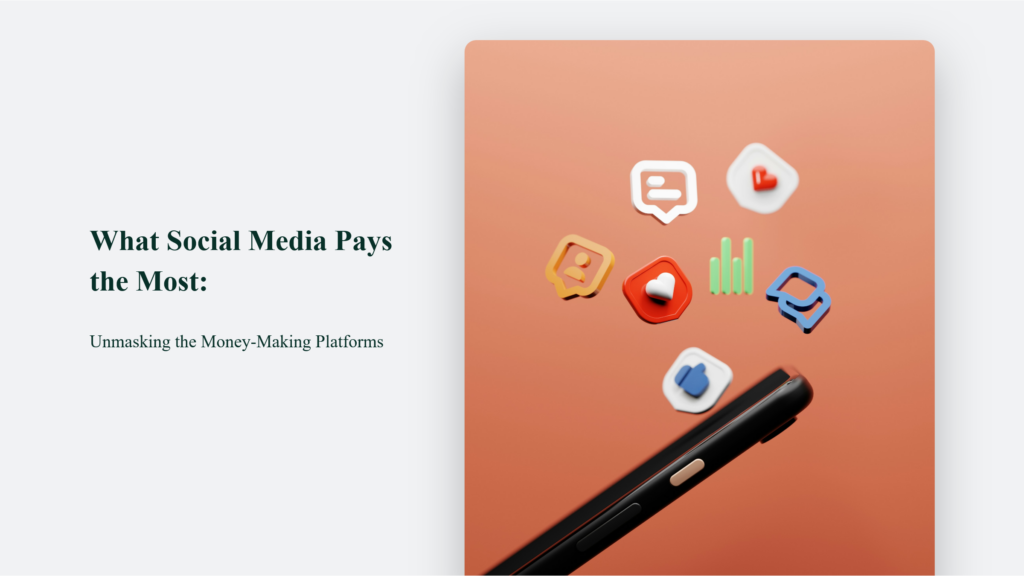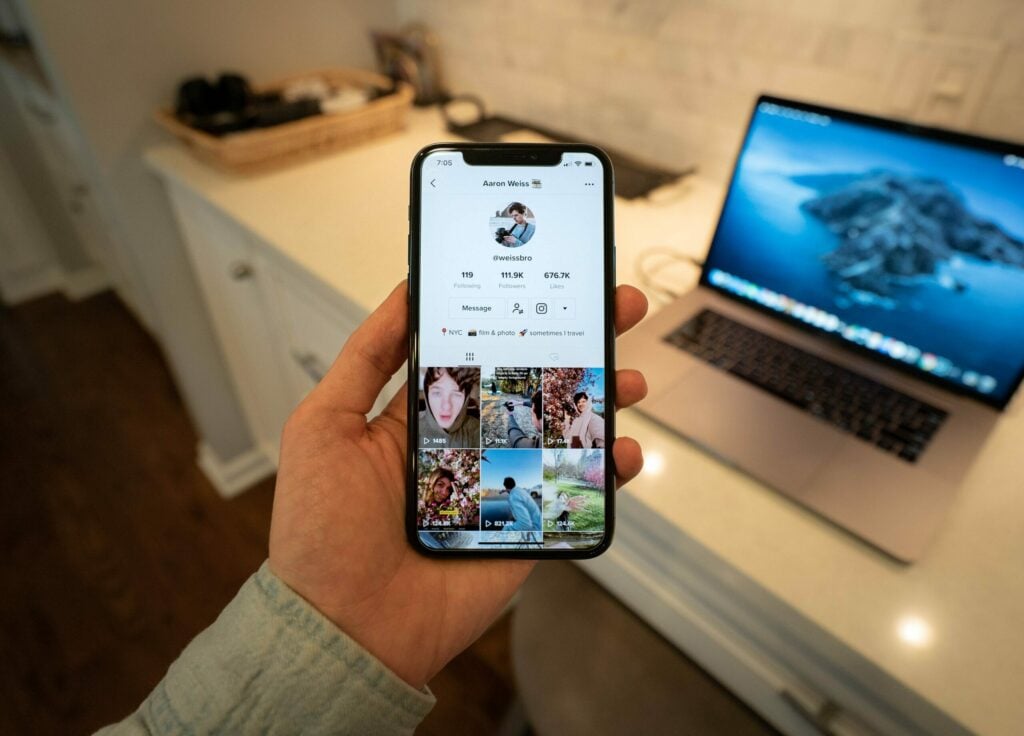

What Social Media Pays the Most: Unmasking the Money-Making Platforms

As Seen On
Let’s cut straight to the chase: you’re here because you want to know which social media platform will stuff your pockets with the most cash. Maybe you’re tired of your 9-to-5 grind, or perhaps you’re just curious about how some influencers seem to live high while posting selfies and unboxing videos. Whatever your reason, I will give it straight – the answer isn’t as simple as you might think.
But here’s where it gets interesting: what social media pays the most isn’t necessarily the one you should focus on. Shocked? Stick with me, and I’ll explain why.

The Social Media Money Game: It’s Not What You Think
Before we discuss which platforms are the cash cows, let’s examine how this whole social media money-making machine works. It’s not just about posting a few photos and waiting for the dollars to roll in (sorry to burst your bubble).
Social media platforms don’t just hand out money because you’ve got a pretty face or a witty caption. They’re businesses, and they’re in it to make money too. The key is understanding how they make money and how you fit into that equation.
Here’s the deal: social media platforms make money primarily through advertising. They have billions of users, and advertisers are willing to pay big bucks to get their products in front of those eyeballs. Where do you come in? You’re the middleman (or woman) who will help those advertisers reach their target audience.
But here’s the kicker: different platforms have different ways of sharing that advertising revenue with creators. Some will pay you directly based on views or engagement, while others require you to hustle and secure your own brand deals. And that’s just the tip of the iceberg.
What Social Media Pays the Most: A Reality Check
Now, let’s get down to what you came here for – which platforms will make it rain? I’ll break it down for you, but remember, your mileage may vary.
Instagram: The Visual Money-Maker
Instagram is like that popular kid in school who seems to have it all. It’s visually appealing, has a massive user base, and brands are falling over themselves to work with popular Instagrammers.
Potential Earnings: According to recent data, Instagram influencers with over 1 million followers can earn upwards of $10,000 per post. Even those with a more modest following of 10,000 to 50,000 can pocket around $100 to $500 per post.
But here’s the catch: building an Instagram following is no walk in the park. You compete with millions of other users, and the algorithm changes more often than Melbourne’s weather.
YouTube: The Long-Form Content King
YouTube is the granddaddy of content monetization. It’s been around for ages (in internet years), and it’s still going strong.
Potential Earnings: Top YouTubers can earn millions per year. While that’s not the norm, even smaller creators can make a decent living. YouTubers can earn $3 to $5 per 1,000 video views. It doesn’t sound like much, but it adds up quickly if you consistently post popular content.
The downside? Creating high-quality video content takes time and effort and is often a significant investment in equipment. Plus, you need to hit certain subscriber and view thresholds before you can even start monetizing.
TikTok: The Rising Star of Short-Form Video
TikTok burst onto the scene like a sugar-fueled teenager, showing no signs of slowing down.
Potential Earnings: TikTok’s Creator Fund pays out based on views and engagement, with creators reporting earnings anywhere from a few cents to $50 per 1,000 views. Top TikTokers can earn millions through brand deals and sponsorships.
The catch? The competition on TikTok is fierce, and trends change faster than you can say “dance challenge.” You need to consistently create, adapt, and hope your content goes viral.
Twitch: The Streaming Sensation
Twitch might be your golden ticket if you’re a gamer or just enjoy live-streaming your life.
Potential Earnings: Twitch partners and affiliates can earn through subscriptions, bits (virtual cheers from viewers), and donations. Top streamers can easily earn six or seven figures annually.
The downside? Streaming for hours on end can be mentally and physically draining. Plus, building a loyal audience takes time and consistent effort.
LinkedIn: The Professional Powerhouse
LinkedIn might not be the first platform that comes to mind when you think of social media earnings but don’t underestimate its potential.
Potential Earnings: While LinkedIn doesn’t offer direct monetization like YouTube or Twitch, it can be incredibly lucrative for B2B companies and professionals offering high-ticket services. A well-crafted LinkedIn strategy can lead to speaking engagements, consulting gigs, and business deals worth tens of thousands of dollars.
The catch? LinkedIn requires a different approach than other platforms. It’s all about building professional relationships and establishing yourself as an industry expert.
Factors That Influence Social Media Earnings: It’s Not Just About Followers
Now, you might be thinking, “Great, I’ll just pick the platform with the highest potential earnings and start raking in the dough!” Not so fast, hotshot. There’s more to this game than just choosing a platform.
- Audience Size and Engagement: Yes, having a lot of followers helps, but engagement is king. A smaller, highly engaged audience can often be more valuable than a large, passive one.
- Niche and Content Quality: Some niches are more lucrative than others. Finance, health, and technology tend to pay well. But whatever your niche, the quality of your content is crucial. Mediocre content won’t cut it, no matter how many followers you have.
- Consistency and Posting Frequency: Social media algorithms favour accounts that post regularly. But it’s a delicate balance – post too little, and you’ll be forgotten; post too much, and you might annoy your audience.
- Monetization Strategies: The smartest creators don’t rely on just one income stream. They combine platform-specific monetization (like YouTube ads) with sponsorships, affiliate marketing, and their own products or services.
The Hidden Costs of Social Media Success: The Dark Side of the Influencer Life
Before you quit your day job to become a full-time influencer, let’s talk about the costs that no one mentions in those “How I Made $100,000 on Instagram” videos.
- Time Investment: Creating quality content takes time – a lot of it. We’re talking hours of planning, creating, editing, and engaging with your audience. Say goodbye to your weekends and evenings.
- Mental Health Considerations: The pressure to constantly create content, stay relevant, and deal with online criticism can take a serious toll on your mental health. The highlight reel you see on Instagram doesn’t show the burnout, anxiety, and self-doubt that many creators face.
- The Pressure of Constant Content Creation: The internet is hungry, and it wants to be fed. Constantly. The pressure to continually produce fresh, engaging content can be overwhelming.
- Financial Investment: Depending on your niche, you might need to invest in equipment, software, or products to create your content. Those costs can add up quickly.

Beyond the Obvious: Alternative Ways to Monetize Social Media
Here’s where it gets really interesting. The savviest social media entrepreneurs know that the real money isn’t in sponsored posts or ad revenue – it’s in leveraging your audience to create multiple income streams.
- Coaching and Consulting: Once you’ve established yourself as an expert in your niche, people will pay for your knowledge and advice.
- Digital Products and Courses: Create an ebook, an online course, or a membership site. These can provide passive income long after you’ve done the initial work.
- Community Building and Membership Sites: Build a community around your niche and charge for access. This can provide a steady, recurring income.
- Speaking Engagements and Brand Ambassadorships: As your influence grows, you might be invited to speak at events or become a long-term ambassador for brands.
The Future of Social Media Monetization: What’s Next?
If there’s one constant in social media, it’s change. What works today might be obsolete tomorrow. So, what’s on the horizon?
- Virtual and Augmented Reality: As VR and AR technology becomes more accessible, new platforms and monetization opportunities will likely emerge.
- Blockchain and Cryptocurrency: Decentralized social media platforms that give creators more control over their content and earnings are rising.
- AI-Generated Content: As AI technology improves, we might see a shift in how content is created and consumed.
- Micro-Transactions and Fan Funding: Platforms that allow fans to support creators directly through small, frequent payments are gaining popularity.
The Bottom Line: It’s Not About the Platform, It’s About You
Here’s the truth bomb you’ve been waiting for: the platform that pays the most is the one that aligns best with your skills, interests, and audience.
You could chase the highest-paying platform, but if you’re not passionate about the content you’re creating or if your audience doesn’t resonate with that platform, you’re setting yourself up for failure.
The real key to making money on social media isn’t about picking the right platform but creating value for an audience. It’s about being authentic, consistent, and adaptable. It’s about treating your social media presence like a business, not a get-rich-quick scheme.
So, instead of asking, “What social media pays the most?”, try asking yourself these questions:
- What platform allows me to showcase my skills and personality best?
- Where does my target audience spend their time?
- What kind of content can I consistently create that provides value to others?
- How can I diversify my income streams beyond just one platform?
Remember, social media is a tool, not a magic wand. It can amplify your message, help you reach a global audience, and potentially make you a lot of money. But it’s not a substitute for hard work, creativity, and genuine connection with your audience.
In the end, the most successful social media entrepreneurs aren’t the ones chasing the highest-paying platform – they’re the ones who’ve found their unique voice, built a loyal community, and created value that extends beyond likes and shares.
So, what are you waiting for? Yesterday was the best day to start and now is the second-best day. Just remember to bring your authenticity, your work ethic, and a healthy dose of patience. The money will follow.
Frequently Asked Questions:
Do I need a large following to make money on social media?
While a large following can certainly help, it’s not the only factor. Many creators with smaller, highly engaged audiences (often called micro-influencers) can earn a good income. The key is having an audience that trusts you and engages with your content. Quality often trumps quantity when it comes to social media earnings.
Which social media platform should I focus on as a beginner?
The best platform for you depends on your strengths, interests, and target audience. If you’re great with short-form video, TikTok or Instagram Reels might be a good fit. If you prefer long-form content, consider YouTube or blogging with a strong social media presence. Research where your target audience spends their time and choose a platform that aligns with your content style.
Konger
Up until working with Casey, we had only had poor to mediocre experiences outsourcing work to agencies. Casey & the team at CJ&CO are the exception to the rule.
Communication was beyond great, his understanding of our vision was phenomenal, and instead of needing babysitting like the other agencies we worked with, he was not only completely dependable but also gave us sound suggestions on how to get better results, at the risk of us not needing him for the initial job we requested (absolute gem).
This has truly been the first time we worked with someone outside of our business that quickly grasped our vision, and that I could completely forget about and would still deliver above expectations.
I honestly can't wait to work in many more projects together!
Disclaimer
*The information this blog provides is for general informational purposes only and is not intended as financial or professional advice. The information may not reflect current developments and may be changed or updated without notice. Any opinions expressed on this blog are the author’s own and do not necessarily reflect the views of the author’s employer or any other organization. You should not act or rely on any information contained in this blog without first seeking the advice of a professional. No representation or warranty, express or implied, is made as to the accuracy or completeness of the information contained in this blog. The author and affiliated parties assume no liability for any errors or omissions.

